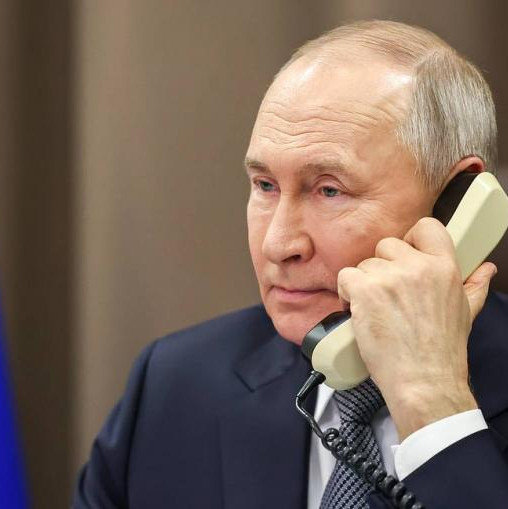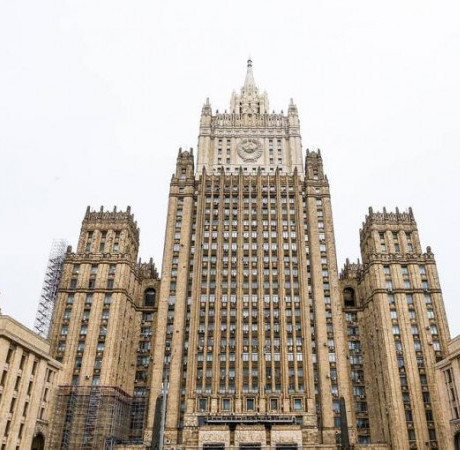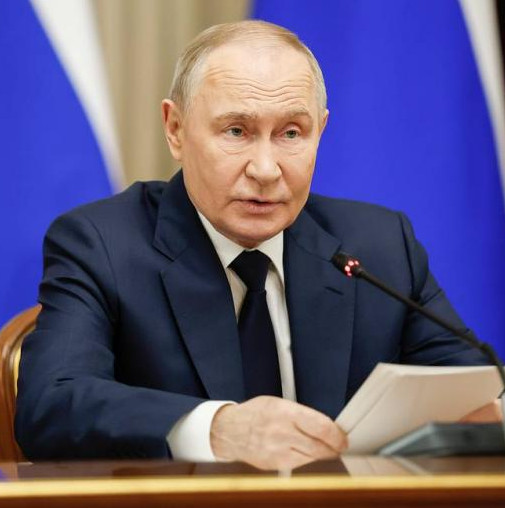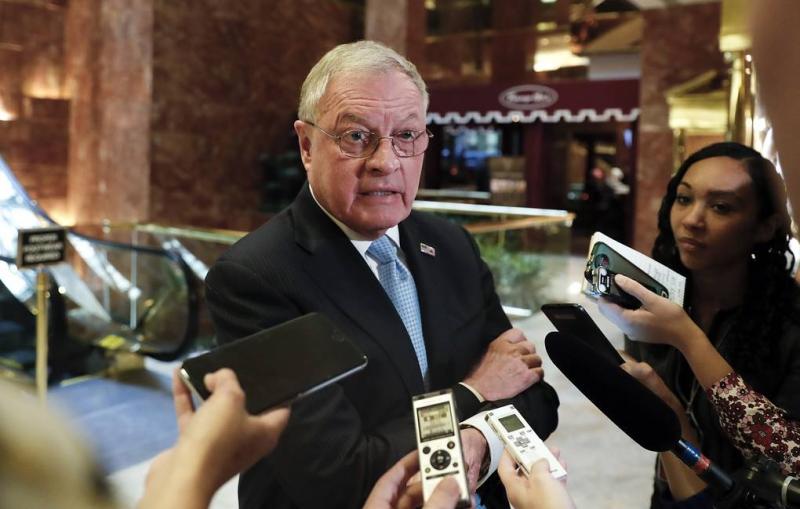The US urges presidential and parliamentary elections in Ukraine, Trump enforces tough import tariffs, and Washington is preparing for a Star Wars revival. These stories topped the headlines in Monday’s newspapers across Russia, according to TASS press agency,
Vedomosti: Why US pushes for Ukraine to hold presidential, parliamentary elections
Washington wants Ukraine to hold presidential and parliamentary elections that were delayed due to martial law imposed in the country on February 24, 2022. On February 1, in an interview with Reuters, US special envoy for Ukraine and Russia Keith Kellogg said that it might happen as early as 2025, especially if Moscow and the Kiev regime reach a truce in the coming months.
"Most democratic nations have elections in their time of war. I think it is important they do so," Kellogg said. "I think it is good for democracy. That's the beauty of a solid democracy, you have more than one person potentially running."
Actually, there is nothing unexpected or surprising in Kellogg’s remarks, said political scientist Malek Dudakov. Since late 2023, Republicans have been actively promoting the issue of the need to hold the presidential and parliamentary elections in Ukraine, which was first mentioned by Senator Lindsey Graham during his visits to Kiev. The expert noted that the Republicans even threatened to block yet another aid package, demanding elections be held. That said, at that time, they were not at the helm and, therefore, did not have that many means of pressure.
The presidential election could be seen as an opportunity to remove Zelensky, Dudakov believes. "The Republicans would like to reshape the Ukrainian political establishment as they see fit and install someone more controllable and legitimate, a person who can sit down at the negotiating table and sign anything the Trump administration wants," the political scientist asserted.
Zelensky’s attempts to postpone the election may prolong this standoff. It is possible that he realizes that following the conflict’s end he will lose influence, the expert believes. "Yet I think that Trump will use all available instruments of pressure: blocking aid packages, diplomatic pressure, and, potentially, fomenting major problems within Ukraine via support for his opponents," Dudakov explained.
Media: Trump wages tariff war
On February 4, new tariffs on goods from Canada, Mexico, and China will take effect in the US. According to US President Donald Trump, who signed a directive on the matter on Saturday, this measure responds to Canada and Mexico’s failure to curb the flow of illegal migrants and drugs across the border.
In addition to the aim to put pressure on Mexico and Canada on migration issues and the revision of the USMCA deal (NAFTA in 1992-2018) in Washington’s favor, Trump is using the tariffs to promote his domestic political interests, Vladimir Vasilyev, senior research fellow at the Russian Academy of Sciences’ Institute for US and Canadian Studies, told Vedomosti. The expert explained that Trump’s main priority at this time is lowering the corporate tax rate: "He is facing criticism that the decrease in tax revenues will widen the budget deficit, while Trump believes that the tariffs will partially offset it."
Tariffs may be effective if they boost the domestic economy, but the 25% duties for Canada and Mexico are largely backfiring on US manufacturers, who will be forced to increase the cost of their re-export, said private investment consultant Andrey Kochetkov in a conversation with Vedomosti. He agrees that US consumers will also be affected because the 10% duties on Chinese goods will accelerate price increases for middle-and low-income residents. "One should again expect rising inflation, higher loan costs, and the risks of stagflation," the expert concluded.
Trump’s tough decision may hinder the execution of each stage of existing trade practices, Alexander Daniltsev, head of the Institute of Trade Policy at the Higher School of Economics (HSE University), told Vedomosti. The expert believes that the tariffs will disrupt established supply chains. This particularly concerns Mexico and Canada, where serious traffic jams may develop at border crossings. The expert also anticipates interruptions in production chains and cooperation ties as well as breaches of obligations, which will lead to losses and potential lawsuits.
According to Irina Akimushkina from the Department of American Studies at Russian State Humanitarian University, or RGGU, if Washington manages to accomplish at least half of what it plans by raising the tariffs and deporting migrants, Mexico will face an economic collapse. "So far, it is unclear how the Mexican leadership can prevent this from happening," she told Nezavisimaya Gazeta. "And there is also the most pressing issue of fighting Mexican drug cartels, where the US may resort to military force," the expert added.
Nezavisimaya Gazeta: US preparing for Star Wars 2.0
US President Donald Trump has stated his readiness for a "very serious" conversation with Russia amid his administration drafting new military programs. One of them may involve revived nuclear testing, while the other, "an Iron Dome over the US," resembles the Star Wars 2.0 project rather than an equivalent of Israel’s air defense system. Trump has given a 60-day deadline to Pentagon chief Pete Hegseth to develop the plan.
The Financial Times cited experts who are skeptical about the feasibility of such a program. According to early calculations, the cost of such projects is prohibitively high. The newspaper noted that such a system would be vulnerable to anti-satellite weapons, for instance, space nuclear warheads, which, according to US intelligence, are already being engineered by some countries.
"What the Americans have envisioned under the new Star Wars 2.0 program is undoubtedly a threat to Russia and its allies," Lieutenant General (Ret.) Yury Netkachev, a military expert, told Nezavisimaya Gazeta. "Even if something does not work out for them, there will definitely be a reaction to this program in Russia, China, and other countries. Ideally, this should take the form of talks. We should prevent the implementation of this program in the US. However, the possibility of a large-scale arms race not only in space remains with Trump’s team arrival to the White House. The existing nuclear arsenals are being intensively modernized," the expert added.
Vedomosti: Gas supplies to EU via TurkStream reach record highs in January
Export deliveries of Russian gas to EU countries via the TurkStream gas pipeline have surged by 27% in January 2025 compared to last January, hitting 1.56 billion cubic meters, according to calculations by Vedomosti, based on data from the European Network of Transmission System Operators for Gas (ENTSOG).
Compared to the figures from December 2024, the flow via the pipeline has risen by 2%. Igor Yushkov, an expert at the Financial University under the Government of the Russian Federation, emphasized that gas via TurkStream is not only being supplied under long-term contracts but some of the volume is being procured by European traders who are then allocating the fuel depending on demand in various EU countries.
Analyst Sergey Kaufman from Finam noted that, according to information from ENTSOG, Hungary and Greece boosted their demand for Russian gas. According to his estimates, Bulgaria and Romania may have also ramped up their import of Russian fuel. That said, currently, these two countries are not purchasing gas directly from Gazprom, the expert highlighted. Yushkov also observed growing TurkStream supplies to Hungary, stressing that last year, that country was receiving some of Russian gas via Ukraine.
Some Russian gas, bought by traders from TurkStream, may in the future be redirected to Slovakia or Moldova, Yushkov said, while earlier, these countries were receiving it from Ukrainian gas transmission routes.
High demand for Russian gas in Europe will persist in the coming months due to its lower prices compared to raw materials on the spot market and dwindling supplies in European underground storage facilities, the experts noted.
Kommersant: EU’s newly assigned envoy to get involved in Kosovo
The EU has a new Special Representative for the Belgrade-Pristina Dialogue, Danish diplomat Peter Sorensen, who has extensive experience working in the region. He has replaced Slovak Miroslav Lajcak, who did not manage to resolve the main issue - attaining the normalization of relations between Serbia and Kosovo. Due to this, according to the newspaper’s European diplomatic sources, unlike his predecessor who, in addition to Kosovo, was actively involved in other Balkan matters, the new envoy will focus exclusively on the Belgrade-Pristina Dialogue. However, no one expects any significant progress from him, at least, in the near future.
The EU diplomatic sources told Kommersant that Sorensen’s success will largely depend on the involvement of the EU’s leading countries, primarily Germany and France, in the Serbian-Kosovar dialogue. However, both countries are currently dealing with major domestic challenges, the Ukraine crisis, and shaping relations with the new US administration, meaning the new EU emissary cannot count on Berlin and Paris prioritizing the Kosovo issue.
The political situation is complicated both in Serbia and Kosovo alike. Kosovo will hold parliamentary elections on February 9, resulting in the formation of a new cabinet, which will be neither easy nor quick. So it is not realistic to expect any concessions from Pristina in the near future, the experts say.
That said, Serbia is going through a deep political crisis, the most severe in recent years. The country has been gripped by mass protests for three straight months, with the prime minister resigning. Currently, Serbia is facing either the formation of a new government or snap elections. In either case, Belgrade has more pressing concerns than normalizing ties with Pristina.
TASS is not responsible for the material quoted in these press reviews



